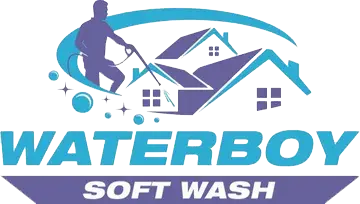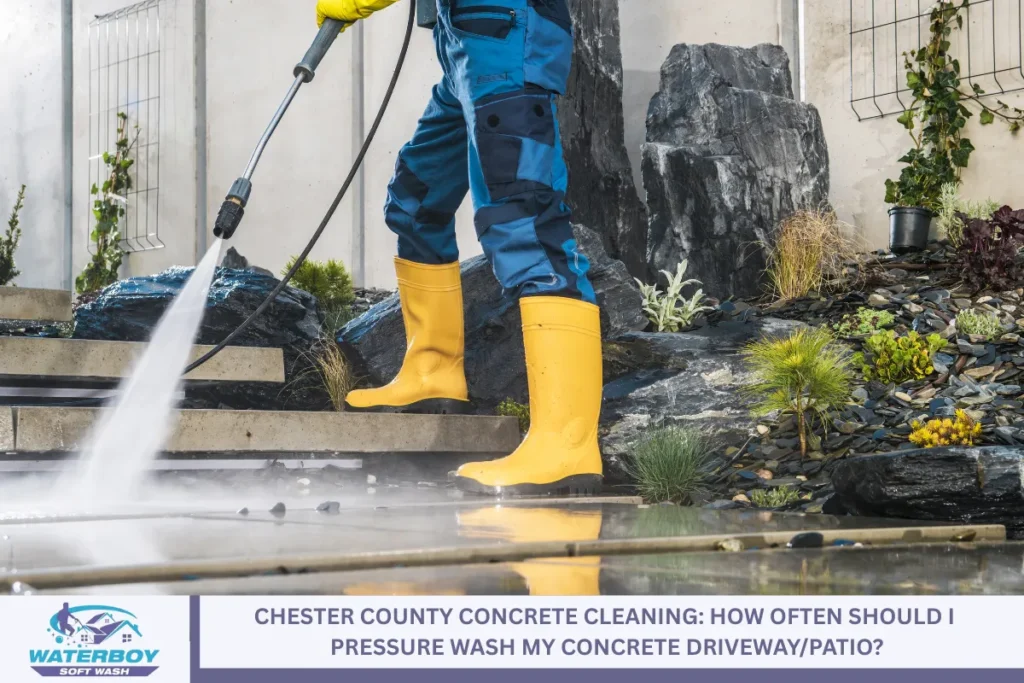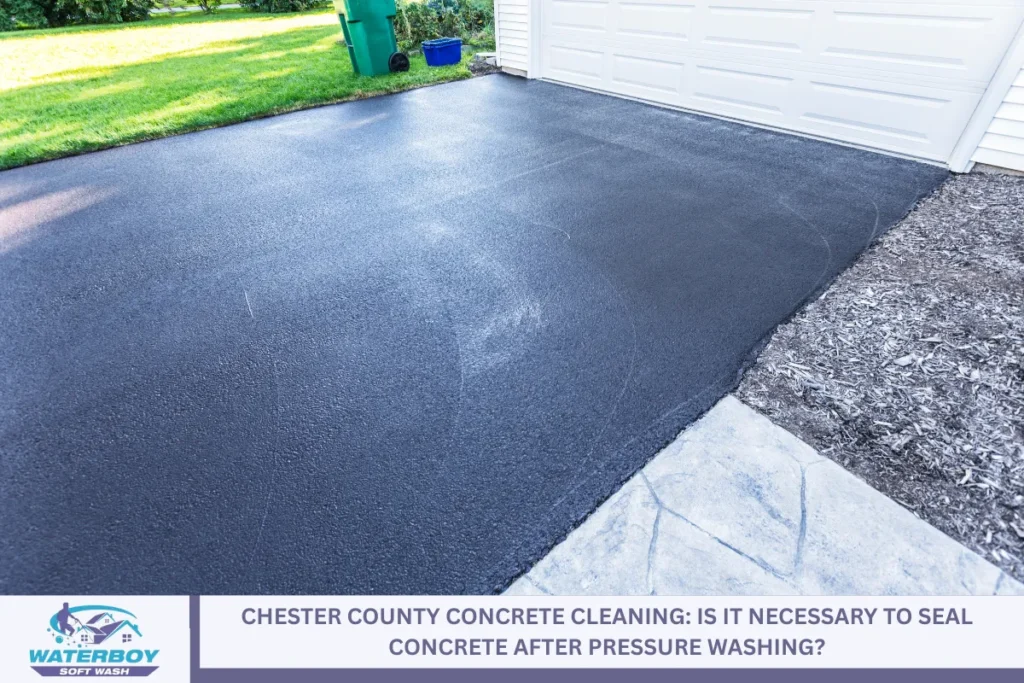Concrete cleaning is a critical part of keeping our sidewalks, patios, and driveways looking their best in Chester County. But many homeowners worry: can you actually damage concrete by power washing? At first glance, pressure washing seems like the perfect way to blast away dirt, stains, and stubborn grime. Unfortunately, using the wrong pressure, chemicals, or cleaning technique can leave permanent marks or weaken the surface. That means your effort to improve curb appeal could actually cause more harm than good! You want spotless concrete that stays strong for years—not surface damage, streaks, or costly repairs. The good news is that safe and effective concrete cleaning is possible. With the right approach and professional know-how, you can remove stains, restore beauty, and protect your investment. Keep reading to discover how to clean your concrete the right way, what common mistakes to avoid, and how the experts in Chester County handle the job from start to finish.
Why Concrete Cleaning Matters in Chester County
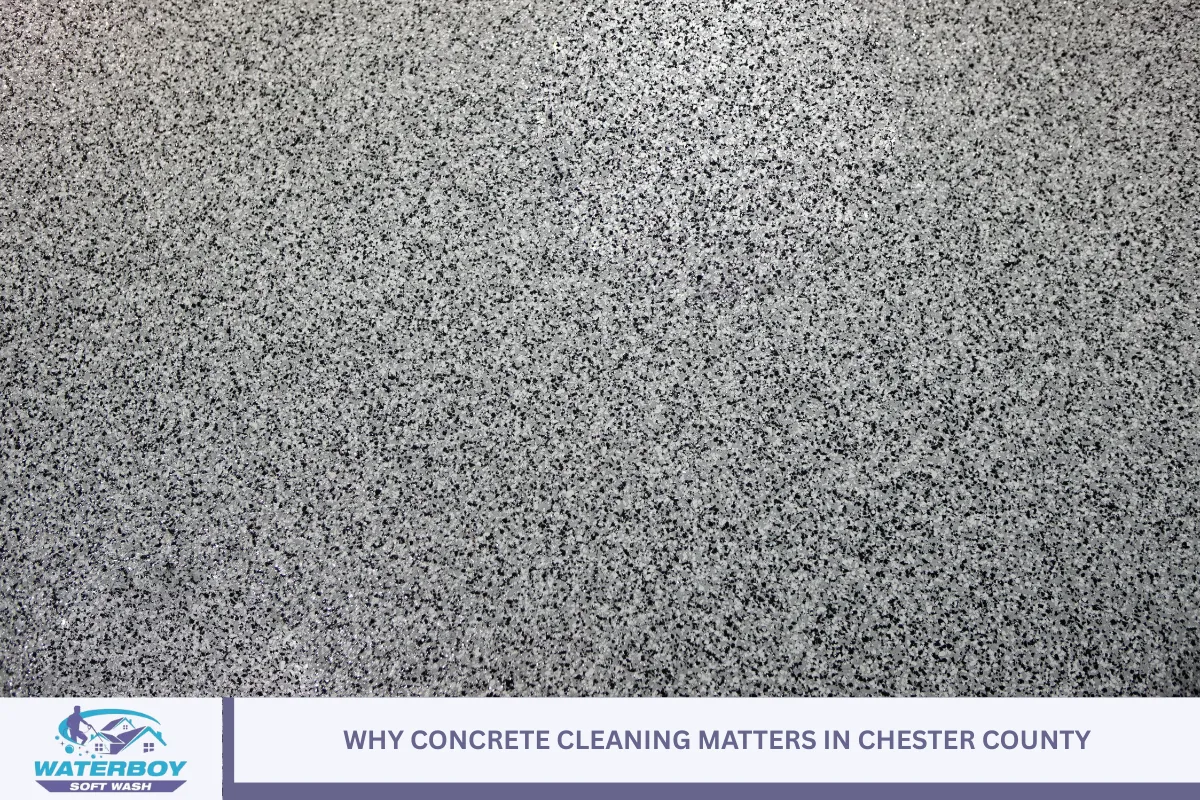
Concrete surfaces are everywhere in Chester County: driveways, sidewalks, pool decks, patios, and paver walkways add convenience and boost curb appeal. Over time, these surfaces collect mold, mildew, algae, dirt, grime, and other contaminants. Seasonal weather—including rain, snow, and sun—makes the problem worse by causing stains and encouraging organic growth.
Regular concrete cleaning helps in multiple ways:
- Improves curb appeal and property value
- Reduces slip hazards by removing algae and grime
- Protects the surface from stains and damage
- Prepares concrete for sealing, painting, or repairs
Whether you’re a homeowner looking for a fresh driveway or a business manager maintaining sidewalks, safe cleaning is essential. Especially in busy areas like West Chester, Malvern, or Downingtown, clean concrete speaks volumes to visitors and customers.
How Concrete Gets Dirty—and Why Simple Washing Isn’t Enough
Concrete is tough, but it’s also porous. This means that dirt, oil, rust, algae, and even chewing gum can find their way into tiny cracks and pockets in the surface. If left untreated, these contaminants cause more than ugly stains—they can make concrete slippery, cause discoloration, and even lead to permanent damage.
Some tough-to-remove hazards include:
- Mold and mildew, particularly in shady or damp areas
- Algae and moss, making surfaces green and slick
- Efflorescence, a white powdery residue from water and salts
- Rust stains from metal furniture or fertilizer spills
- Oil and grease from vehicles
- Paint or graffiti
A garden hose or broom won’t solve these problems. For deep cleaning, you need specialized equipment and know-how.
The Tools and Techniques of Concrete Cleaning
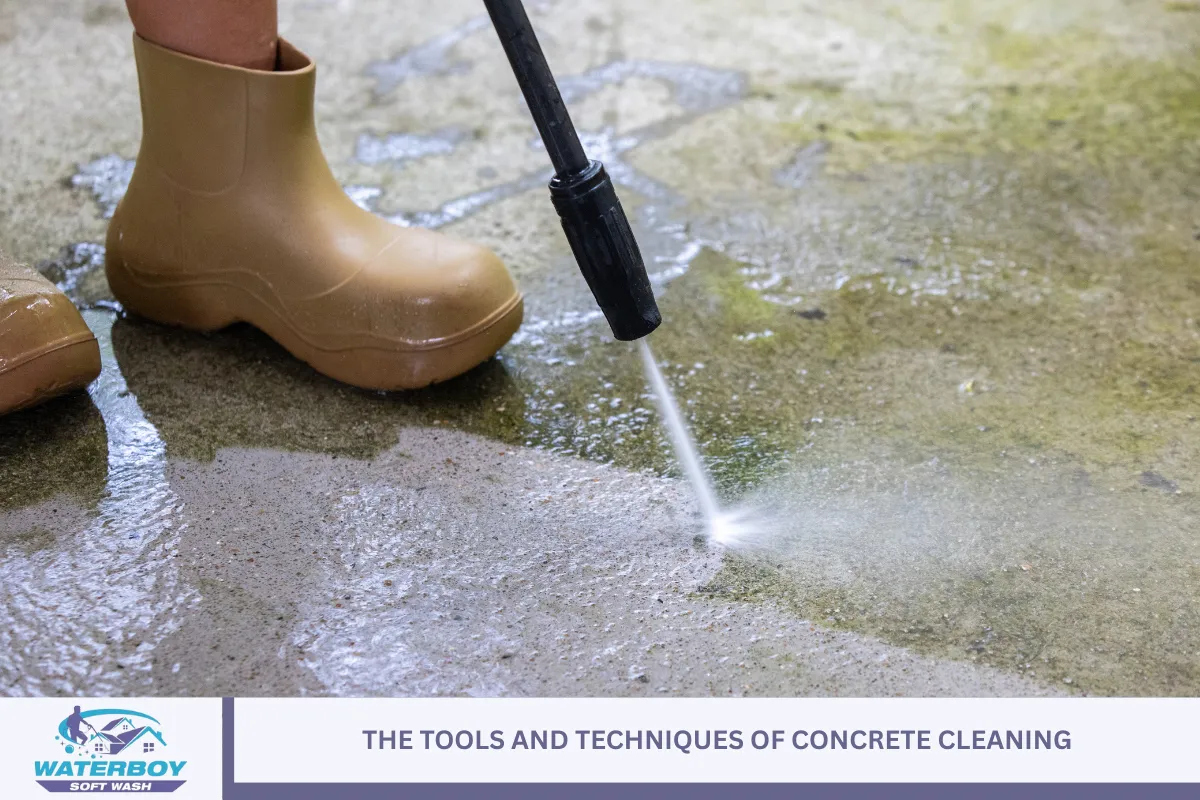
Professionals in Chester County rely on the right pressure washing equipment, detergents, and techniques for safe results. Here’s a breakdown:
Equipment
- Pressure Washer: Adjusts the water pressure (PSI) for various surfaces. Concrete often requires 2500–3500 PSI, but too high can cause damage.
- Surface Cleaner: A round, spinning attachment that provides even cleaning without streaking or tiger stripes.
- Hot Water Machines: Hot water washing boosts cleaning power against oil, grease, and tough stains.
- Nozzles: Different angles (0°, 15°, 25°, rotary/turbo) control spray width and strength.
- Concrete cleaning equipment: Sometimes includes special brushes, wands, and water tanks for larger jobs.
Chemicals
- Biodegradable Detergents: Break down dirt and stains for easier removal.
- Eco-friendly solutions: Non-toxic and safe for pets, plants, and the environment.
- Degreasers: Essential for removing oil and grease.
- Specialty treatments: For rust, gum, graffiti, and efflorescence removal.
Process
- Pre-Treatment: Apply soap, degreaser, or specialized stain-removal products.
- Dwell Time: Allow chemicals to loosen mold, algae, and contaminants.
- Pressure Washing: Use the correct wand tip, standoff distance, and pressure.
- Rinse: Wash away loosened residues and chemicals.
- Spot Treatments: Address any remaining stains.
- Post-Treatment (Optional): Sealing or re-sanding for paver walkways, patios, or brick patios.
By following these steps, professionals avoid common pitfalls and ensure every part of your driveway, sidewalk, or patio is fully cleaned.
Power Washing Dangers: How Damage Happens
Many people think higher water pressure equals cleaner concrete, but high-pressure washing without skill or planning is risky. Here’s how incorrect methods can cause problems:
Surface Damage
- Etching: Water cuts into the concrete, creating permanent grooves or roughness.
- Scarring/Streaking: Uneven cleaning, often from improper wand movement or using a wand instead of a surface cleaner.
- Tiger Striping: Stripes left by overlapping sprays or inconsistent pressure.
- Spalling/Scaling/Flaking: The surface peels or flakes away, especially on older or previously damaged slabs.
Structural Problems
- Exposing Aggregate: Blasting away the top layer reveals stones and weakens concrete.
- Mortar Joint Erosion: Joint sand or mortar between brick/pavers washes out.
- Chipping/Cracking: High pressure or wrong nozzle choice can break away good concrete.
- Removing sealer or paint: Too much pressure can strip away protective layers.
What Causes These Issues?
- Too high PSI: More is not better.
- Wrong nozzle: Turbo or narrow nozzles focus too much force.
- Holding the wand too close: Reduces distance, increases intensity.
- Inexperience: DIY efforts without proper technique.
- Cleaning new/weak concrete: Not waiting for concrete to cure (usually at least 28 days).
Safe Cleaning Techniques: How Experts Protect Your Concrete
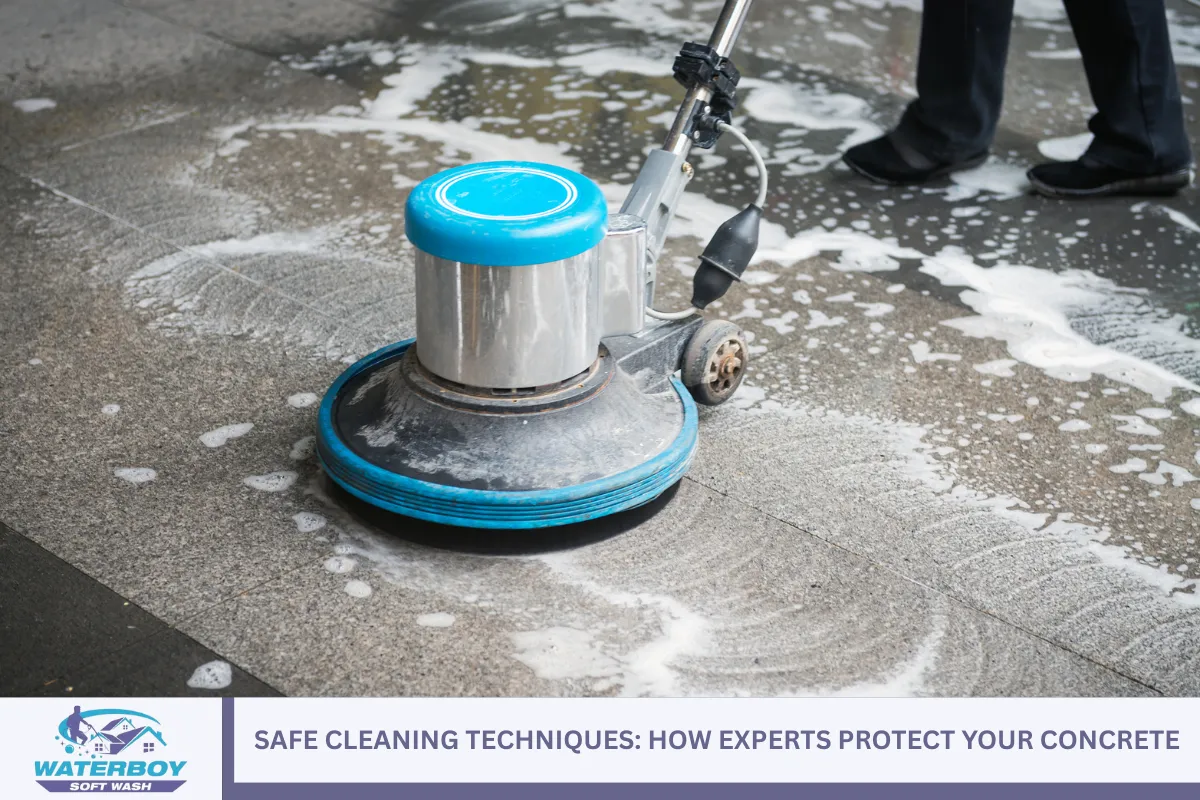
Professionals serving Chester County—follow these best practices to protect your surfaces:
- Always test a small, hidden spot first
- Adjust PSI to recommended levels (usually 2500–3500 for older, durable concrete)
- Use a surface cleaner for uniform passes
- Maintain proper stand-off distance (usually 12–18 inches)
- Let detergent do the hard work—minimize reliance on brute force
- Use hot water when necessary for grease or oil
- Apply gentle methods for sensitive surfaces (synthetic decking, stamped concrete, flagstone patios, brick patios)
- Use environmentally-friendly products and biodegradable detergents to protect nearby gardens and lawns
- Train and maintain experienced technicians
- Carry full insurance, provide warranties, and guarantee customer satisfaction
DIY vs. Professional Concrete Cleaning
Many homeowners are tempted to rent or buy pressure washing equipment and tackle dirty driveways or patios themselves. While light cleaning is possible, mistakes are easy to make.
Common DIY risks:
- Using too much pressure and causing surface damage
- Not knowing which nozzle or attachment to use
- Skipping pre-treatment or relying on water alone
- Cleaning new, uncured, or weakened concrete too soon
- Inconsistent results—tiger striping, missing spots, or damaging finishes
Professional pressure washing services, trained in exterior cleaning, understand how to treat every surface —from rough cement to smooth aggregate —and use hot water washing, the right surface cleaner, and proper techniques to do the job safely.
Is Soft Washing Better for Certain Surfaces?
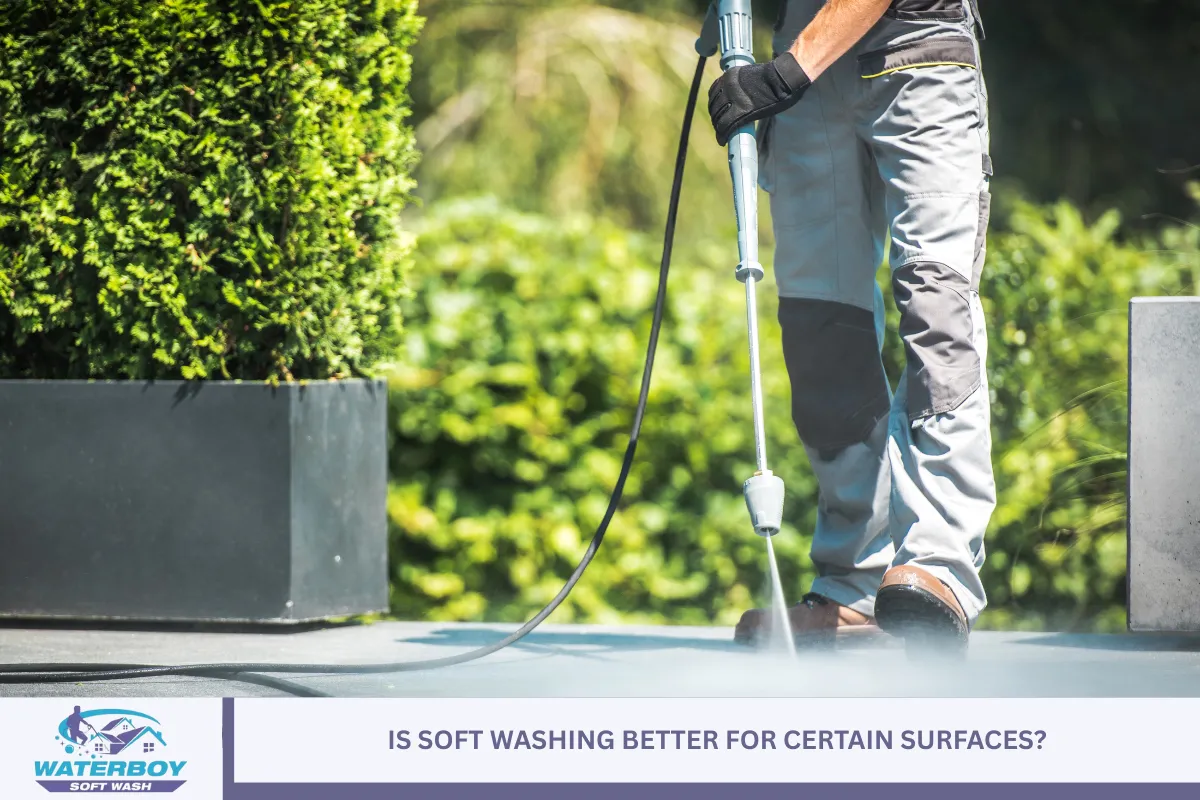
Soft washing uses low-pressure water and specialized cleaners to gently remove contaminants such as mold, algae, and mildew from delicate surfaces.
This technique is best for:
- Vinyl siding
- Stucco
- Roofs
- Synthetic decking
- Older or weakened concrete
For most concrete driveways or sidewalks in Chester County, a combination of chemistry and gentle pressure washing is best. For new or specialty surfaces, soft washing avoids chipping, scarring, or cracking.
Concrete Sealing and Preventative Maintenance
After cleaning, many Chester County professionals recommend sealing your concrete driveway, patio, or walkway. Benefits include:
- Protection: Sealer guards against stains, water, and cracking from freeze-thaw cycles.
- Easier Cleaning: Dirt and contaminants don’t soak in as easily.
- Appearance: Enhances the color and texture of both poured concrete and pavers.
- Longevity: Extends the life of your investment.
Have a pro check your surface before adding sealer. They can reseal or add joint sand to paver walkways for maximum performance.
Signs a Surface Needs Professional Cleaning
Not sure when it’s time for professional power washing services? Look for:
- Black streaks, green algae, or moss on driveways or pool decks
- Slippery areas on sidewalks or patios
- Rust, oil, or fertilizer stains that won’t rinse away
- White, powdery residue (efflorescence)
- Faded look on stamped or colored concrete
- Excess dirt, gum, or graffiti on commercial properties
Annual or seasonal cleaning (especially after winter in Chester County!) protects against slip hazards and keeps your property looking its best.
Commercial Concrete Cleaning in Chester County
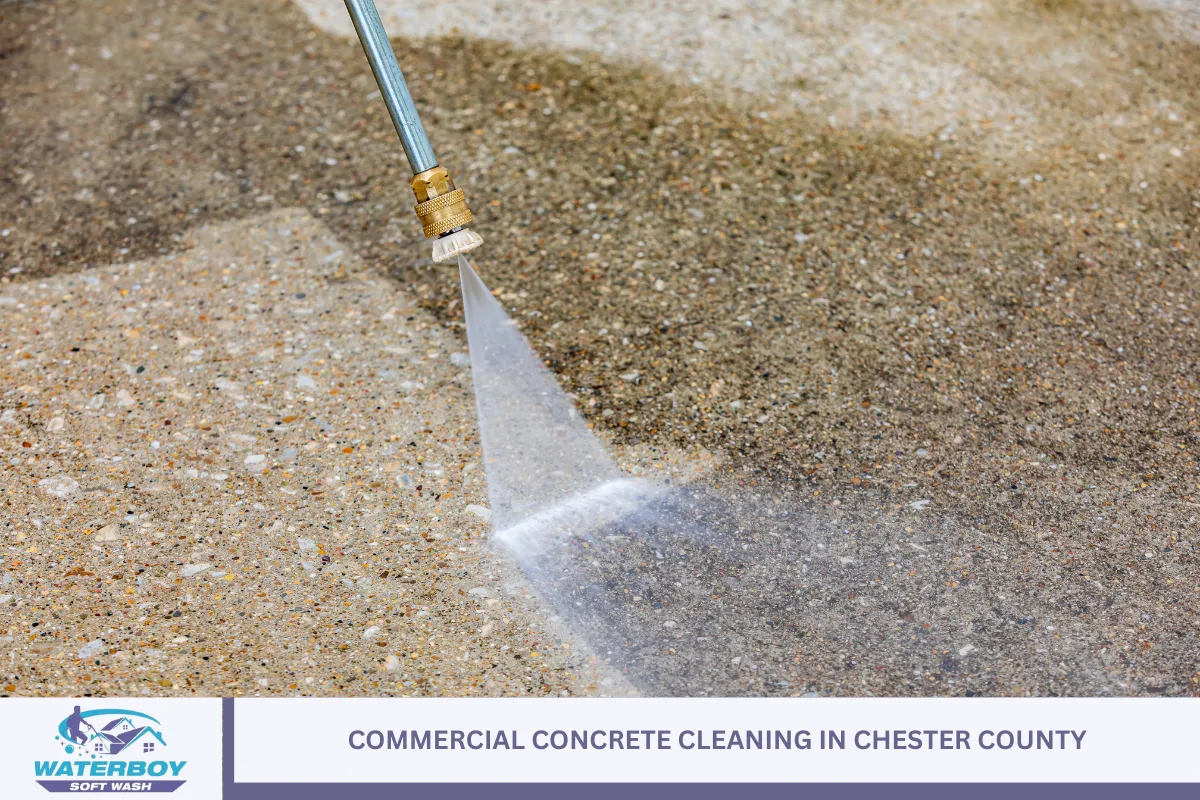
Business owners, property managers, and HOAs rely on commercial power washing to maintain:
- Storefronts and entryways
- Parking lots and curbs
- Apartment and condo walkways
- Pool decks, stairs, and patios
Clean concrete conveys professionalism and care. More importantly, it helps prevent slip-and-fall accidents and reduces liability. Many services offer maintenance plans, free estimates, and satisfaction guarantees for ongoing care.
How to Choose a Professional Concrete Cleaning Service
Not all companies are created equal. When choosing professional pressure washing services in Chester County, look for:
- Locally or veteran/family-owned business
- Fully insured and properly licensed
- Experienced technicians with proven results
- Use of paver sanding and sealing services (if needed)
- Satisfaction guarantee or warranties
- Commitment to using environmentally-friendly products
- Free quote or estimate, plus transparent scheduling
Tips to Keep Concrete Clean Between Professional Washes
- Sweep or blow away leaves, dirt, or debris often
- Hose down spills (oil, fertilizer, etc.) quickly
- Scrub off gum, paint, or seeds before they set in
- Reseal your concrete or pavers every 2–3 years
- Schedule seasonal cleaning, especially each spring after harsh Chester County winters
Chester County Concrete Cleaning – Water Boy Soft Wash
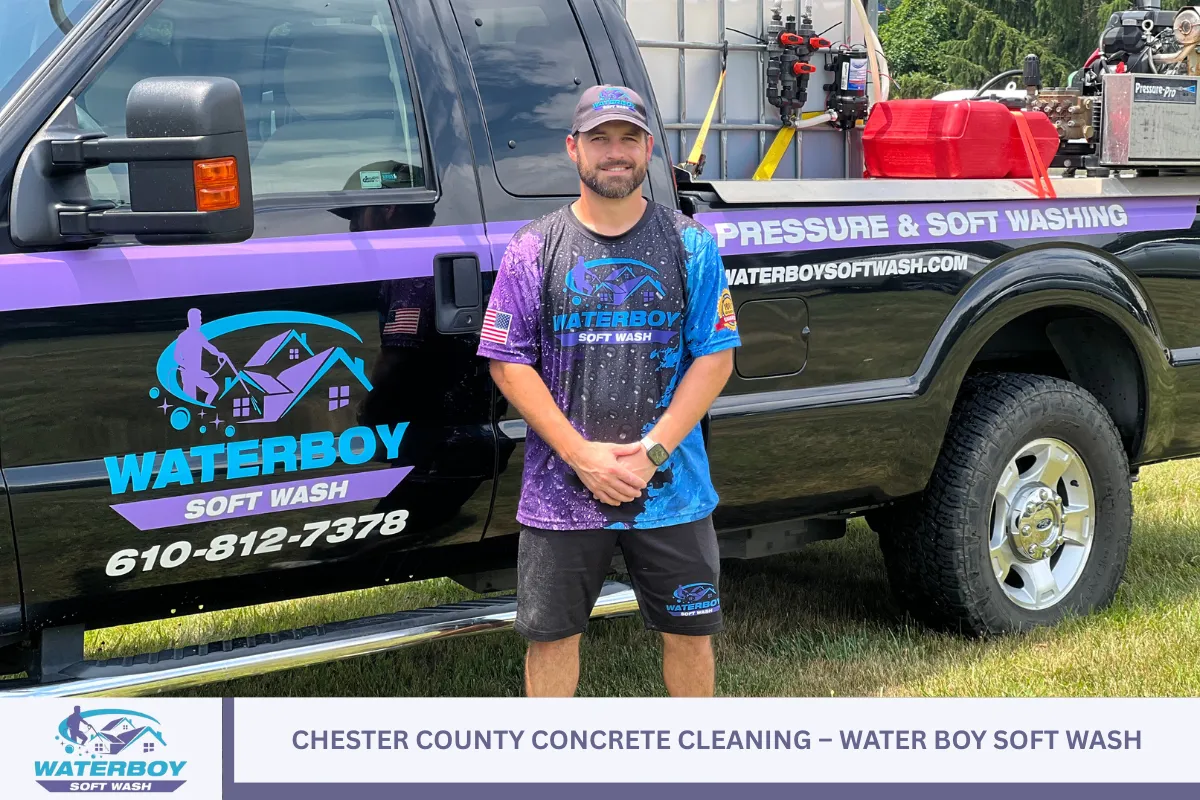
Protect your property and boost curb appeal with professional concrete cleaning from Water Boy Soft Wash! Many Chester County homeowners don’t realize power washing can damage concrete if done incorrectly—leaving etching, stains, or weakened surfaces. Our expert team uses the safest techniques, gentle pressure, and eco-friendly solutions to thoroughly clean driveways, patios, and sidewalks—without risking your investment. We eliminate algae, stains, and built-up grime, restoring lasting beauty and safety to your home. Don’t risk DIY damage. Trust the Chester County specialists in concrete cleaning who put protection first—so you enjoy spotless, strong surfaces for years.
Call us today at (610) 812-7378 to schedule a consultation and experience the Water Boy Soft Wash difference. We proudly serve Chester County!
Frequently Asked Questions
1. How long should concrete cure before power washing?
Concrete needs at least 28 days to cure and harden fully before it can be safely power-washed. Attempting concrete cleaning before this period can result in etching, scarring, or even surface scaling because the slab hasn’t reached its full strength. For colored or stamped concrete, it’s especially important to wait until the curing process is complete to avoid fading or damage to special finishes. If you’re unsure whether your surface is ready, test a small, hidden spot or reach out to a professional for advice.
2. What’s the best way to remove rust or oil stains from concrete?
Rust and oil stains are common on Chester County driveways. Professionals typically use specialized biodegradable detergents and stain removers—never just water. They apply a targeted pre-treatment, allow it to dwell, then use an appropriate water pressure setting and a surface cleaner. Hot water washing is particularly effective on oily stains. For stubborn rust, eco-friendly solutions that break down iron deposits are preferred. Avoid using acid-based cleaners yourself, as they can damage concrete surfaces.
3. Can power washing help with concrete affected by winter freeze-thaw damage?
While power washing can’t fix cracks or scaling caused by freeze-thaw cycles, a professional cleaning does remove contaminants—like salts, mold, and dirt—that worsen damage. After winter, surface cleaning prepares concrete for repairs, sealing, or paver re-sanding, and can uncover hidden issues. Always inspect for flaky or chipped spots before scheduling a wash, and let professionals determine the appropriate procedures for areas affected by weather.
4. How do experts decide what pressure to use for concrete cleaning?
Professional pressure washing services base their settings on the type, age, and condition of the concrete. For newer, stamped, or colored concrete, they often use lower PSI and a more gentle cleaning solution to protect overlays and colorations. For older, durable slabs, they may use up to 3500 PSI with a surface cleaner. The use of hot water, detergents, and specialty nozzles also plays a role. All professionals start with a test spot and adjust accordingly to avoid surface damage.
5. What is a surface cleaner, and why is it better than a standard wand for concrete?
A surface cleaner is a round, flat attachment with spinning bars underneath that spray water evenly across the surface. Unlike a standard wand, which can leave streaks or “tiger stripes,” a surface cleaner produces uniform results and protects concrete from accidental etching. It speeds up the job, reduces water usage, and is the tool of choice for professional power washing equipment during driveway and patio cleaning in Chester County.
Read more: Common Mistakes to Avoid When Power Washing Outdoor Walls in Downingtown, PA
